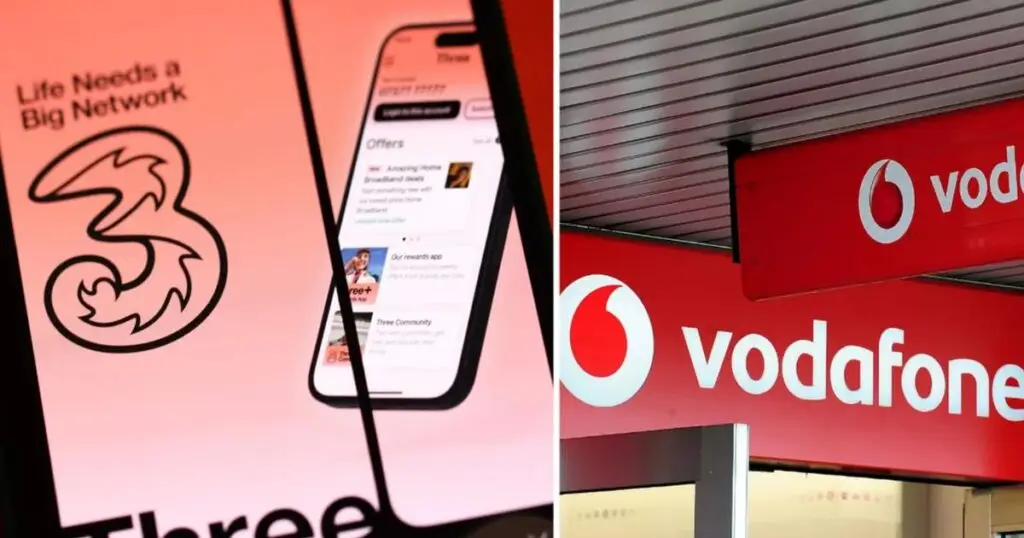Despite the UK competition authority voicing new apprehensions about the proposed £15 billion amalgamation of Vodafone and Three’s UK operations, market experts have indicated that the outcomes of the recent inquiry appear more favourable than anticipated.
The Competition and Markets Authority (CMA), in its preliminary report, highlighted possible price hikes for a multitude of mobile users and cautioned against a potential decline in services, including reduced data offerings. Moreover, the regulator pinpointed “particular concerns” regarding the merger’s impact on vulnerable consumers, who might encounter increased costs or be compelled to contribute towards network enhancements “they do not value.”
Countering these issues, Vodafone’s CEO Margherita Della Valle stated: “We do not agree that prices will go up. From the outset, we have been very clear that the merger will not affect our pricing strategy and that all social tariffs will continue to protect the vulnerable.” Della Valle also refuted the notion that the transaction would adversely influence the wholesale market, noting that 90 per cent of UK MVNOs depend on either VMO2 or BT/EE for their wholesale needs. She further argued: “A combined stronger network would significantly boost competition in the wholesale market by giving MVNOs more choice and better quality from three scaled wholesale network providers.”
Vodafone and Three initially announced their merger last summer, promoting it as a game-changing move that would enhance competition, improve service quality, and inject £11 billion into the rollout of 5G networks across the UK. The British government gave the merger the go-ahead in May, dismissing national security concerns linked to CK Hutchison, the Hong Kong-based owner of Three. However, approval from the Competition and Markets Authority (CMA) is still pending, with regulators examining whether the merger, which would decrease the number of major UK operators from four to three, could harm competition.
The CMA also expressed concerns that the merger could make it more difficult for smaller mobile operators like Sky Mobile and Lyca Mobile to offer competitive deals to customers. They also worry that the merged company might be less willing to participate in network-sharing agreements, potentially hindering BT’s mobile network rollout.
Despite these concerns from the CMA, some industry analysts are now more optimistic about the deal’s prospects. Paolo Pescatore, media analyst and founder of PP Foresight, suggested that the CMA’s findings “signal a potential pathway, importantly through behavioural rather than any structural remedies.” While the focus remains on potential price increases, he noted, “it’s pence per month and doesn’t outweigh the benefits of building the network the country deserves.” Matthew Howett, founder and chief executive of Assembly Research, commented that with the CMA ruling out structural remedies such as forced asset sales, “for the first time, we can see a pathway for the deal to complete.”
In early August, due to the complexity and “very wide scope” of the inquiry, the CMA extended its final deadline to conclude the investigation and publish its findings until December 7. Karen Egan, Head of Telecoms at Enders Analysis, suggested that the CMA’s provisional findings are “a lot more positive than first appears,” highlighting that the anticipated price increase would equate to merely 28p per subscriber each month. She stated that Enders now anticipates a “positive one” conclusion.
Kester Mann, analyst and director of consumer and connectivity at CCS Insight, expressed that “Vodafone and Three should be encouraged by the tone of the CMA’s report, which appears more open to the merger than I was expecting.” Mann also noted that “The main knockback to the merging parties is that the CMA considers claims of superior network quality post integration to be ‘overstated.'”
In an attempt to influence the watchdog, Vodafone has made a legally binding pledge to invest £11 billion in digital infrastructure, providing a breakdown of its spending by geographic area and spectrum allocation. “We’re not only committing to spend the money, we’re committing on where to spend it,” declared Ahmed Essam, Vodafone Germany’s executive chairman and chief of European Markets, formerly spearheading Vodafone UK. The investment by the telecom giant aims to encompass urban centres, villages, and rural expanses throughout all four constituent countries of the UK.
Essam disclosed that during discussions, the Competition and Markets Authority expressed doubts regarding Vodafone’s commitment to its £11 billion investment post-merger. However, he asserted that a legally-binding pledge would sit under Ofcom’s watchful eye, fraught with “massive penalties” for non-compliance. “This shows our commitment towards the merger,” Essam remarked, painting an optimistic forecast of unveiling the UK’s largest 5G standalone network as a product of this consolidation. In line with prior declarations, Vodafone has also prolonged its network-sharing partnership with Virgin Media O2. This move, Essam suggests, will maintain a competitive balance among the trio of telecommunications giants: the merged entity of Vodafone and Three, BT/EE, and Virgin Media O2.
Robert Finnegan, the helm of Three UK, has cast his firm’s financial status as “unsustainable” absent a merger. Furthermore, despite looming prospects of job redundancies post-merger — with Unite The Union anticipating a potential culling of 1,600 positions — Finnegan has sounded notes of caution. Unite has sharply criticised the merger, denouncing it as “reckless.” Some competitors within the industry are against the proposed merger, with BT launching a scathing critique in a 40-page dossier. The telecom giant argues that the deal would give the combined entity a “disproportionate share of capacity and spectrum,” potentially damaging competition and discouraging investment in the UK.
The £15 billion merger between Vodafone and Three continues to elicit mixed reactions. While analysts are cautiously optimistic and view the CMA’s findings as a pathway to completion, concerns remain about potential price increases and impacts on smaller operators. The focus now shifts to the CMA’s final verdict in December, which will determine the future landscape of the UK’s mobile network industry.


